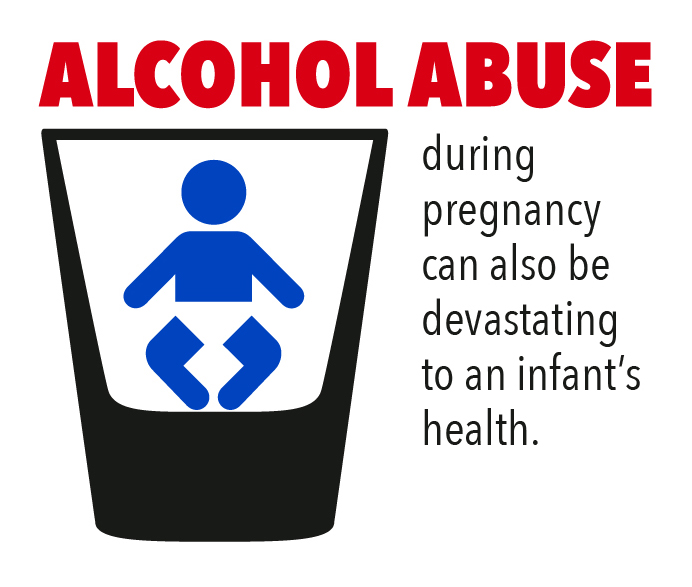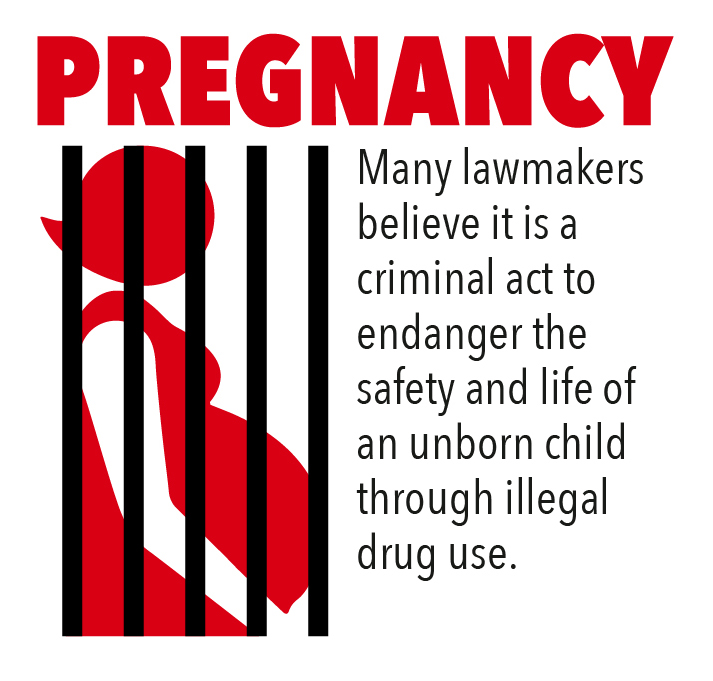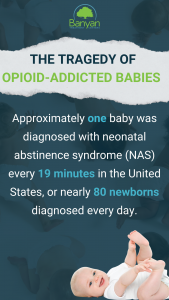Updated 06/2021
If there’s anything more heartbreaking than the opioid and heroin epidemic wreaking havoc on men and women across America, it’s the opioid addicted babies who are born as a result. It would be impossible to imagine the pain that helpless babies born with opioid addiction must feel when they experience uncomfortable and uncontrollable symptoms like vomiting, sweating, and diarrhea. Yet, as sickening as this may seem, this is the reality facing thousands of newborns in the U.S. every day. Approximately one baby was diagnosed with neonatal abstinence syndrome (NAS) every 19 minutes in the United States, or nearly 80 newborns diagnosed every day.1 Our drug and alcohol rehab in Palm Beach is looking more into neonatal abstinence syndrome and the tragedy of opioids babies in the U.S.
History of Neonatal Abstinence Syndrome (NAS)
Neonatal Abstinence Syndrome (NAS) involves a group of problems that occur in a newborn who was exposed to addictive drugs (typically opiates) while in the mother’s womb.2 These infants develop a dependence on the drug while in the womb and are still dependent at birth. But because the baby is no longer receiving the drugs through the placenta, withdrawal may occur. Although NAS could have been an issue when opioids were first abused as early as 2,000 B.C., opioid prescriptions for pain management in pregnant women doubled from 1995 to 2009, contributing to a growth in NAS rates among children.3
Despite the repercussions of abusing opioids during pregnancy, millions of parents addicted to drugs avoid receiving medical detox treatment for fear of intense withdrawal effects and being separated from their children. However, this leaves babies born addicted to drugs like opioids without an option. Instead, they are forced to endure painful, debilitating, and, at times, life-threatening opioid withdrawal symptoms.
Drug Babies: The Youngest Victims of America’s Opioid Epidemic
[embedyt] https://www.youtube.com/watch?v=PiUoeKyBqtU[/embedyt]
As more and more Americans seek out opioid addiction treatment, it’s the most helpless among us who are being forgotten. Although we do offer prescription drug and heroin detox in Palm Beach, not enough people are getting the help they need. The drug-addicted babies statistics are disturbing, and the opioid epidemic directly causes the growing rate of NAS cases. Overdose deaths from opioid abuse have skyrocketed over the past decade and a half. The number of opioid-involved overdose deaths rose from 21,088 in 2010 to 47,600 in 2017. In 2019, overdose deaths peaked at 49,860 in the U.S.4 As a result of the opioid epidemic, the number of infants born suffering from addiction and facing withdrawal has also increased.
Many of us are well aware of the repercussions of addiction in adults, but very little is understood about the impact it has on infants. After months of being fed opioids through the mother, these babies that are addicted to drugs experience excruciating pain and discomfort.
Symptoms of Babies Born Addicted to Opioids
Our Florida behavioral health center has seen the devastating effects opioid addiction can have on adults, but the side effects of babies born addicted to opiates are similar.
Some of the most common symptoms of drug babies include:
- High-Pitched Cry
- Jitteriness
- Tremors
- Convulsions
- Fever
- Sweating
- Vomiting
- Diarrhea
- Mottling (skin discoloration)
- Difficulty Sleeping
- Loss of Appetite
- Dehydration
These symptoms may begin as soon as 24 hours after birth or as late as ten days. They are not only uncomfortable for the newborn baby, but they can also be deadly. The severity of drug baby symptoms will vary based on the type of substance used, the last time it was used, and whether the baby is premature or full-term. In many cases, symptoms last for up to five days. In the event of sustained symptom escalation (which is when the symptoms persist longer), treatment often requires pharmacological intervention using methadone or morphine. Pharmacological intervention is needed for 50 to 70 percent of NAS infants.3
Long-Term Effects of Babies Born Addicted to Opiates
NAS newborns or opiate-addicted babies may suffer from several negative side effects. Limited information is available about the long-term Neonatal Abstinence Syndrome effects, largely because it would be extremely difficult to isolate all of the independent factors, including comorbid substance exposure and environmental influences. It would also be nearly impossible to determine the long-term effects of NAS because there are too many other variables that could compromise the conclusion.
Methadone is sometimes used to help these babies detox from opiates, but this form of treatment can also be dangerous. Based on observation and maternal reports, methadone treatment for babies has resulted in increased motor rigidity, dysregulated motor patterns, and decreased overall activity. These issues were present in toddlerhood and were associated with less social responsivity, shorter attention spans, and poorer social engagement.5
In a longitudinal study involving 200 methadone-exposed and non-exposed infants from demographically matched families, researchers found the following:6
- Deficits in regulation, quality of movement, and excitability in one-month-old methadone-exposed infants.
- Clinically significant motor delays in nine-month-old methadone-exposed infants. These motor delays primarily included independent sitting and crawling.
The Effects of Drugs and Alcohol on Babies

Most of what a pregnant woman consumes is passed on to her baby through the placenta. Although Neonatal Abstinence Syndrome is typically specific to opiates, no amount of drugs or alcohol is safe for a child, and expecting mothers would be wise to stop abusing these substances during their pregnancy and even during breastfeeding. Babies addicted to drugs are at risk for many health issues, but overall illicit and prescription drug abuse during pregnancy can lead to a miscarriage, low birth weight, increased risk for illness, intellectual disabilities, and even death.7
Cocaine use, specifically during pregnancy, may cause the expecting mother’s water to break prematurely, and babies who are exposed to the drug in the womb will be at a higher risk for stroke, deformed limbs, brain damage, and long-term behavioral problems, among many other potential health difficulties.7
No amount of drugs or alcohol is safe for a child. Alcohol abuse during pregnancy can cause horrible defects as well. A fetus is incapable of processing alcohol in the same way that an adult can because the alcohol is more concentrated and prevents nutrients and oxygen from reaching developing organs. Drinking alcohol during pregnancy can lead to the development of fetal alcohol syndrome (FAS). This condition covers a wide range of symptoms, including:
- A Small Head
- Dental Malformations
- Delayed Development
- Intellectual Disability
- Kidney Defects
- Heart Problems
- Poor Coordination
- Difficulties with Speech, Movement, and Social Skills
- Deformed Limbs or Fingers
- Below Average Height and Weight
- Behavioral Disorders 8
Drinking alcohol during the first trimester of pregnancy is extremely dangerous, as this is the time when vital organs are being developed in the fetus. It is especially important that women stop drinking before trying to get pregnant. Several weeks may pass before the pregnancy is discovered, and drinking during this period could put a newborn at risk of several health problems, as indicated above. Consuming alcohol while breastfeeding is also dangerous because alcohol passes through the body and into the breast milk easily. Continual exposure to alcohol in breast milk can lead to problems with mental and motor development.
What to Do With The Mothers of Opioid-Addicted Babies

As the opioid epidemic has continued to grow, so has the controversy surrounding repercussions for women who abuse drugs during pregnancy. Many lawmakers throughout the nation believe that it is a criminal act to endanger the safety and life of an unborn child through illegal drug use.
Tennessee is currently the only state in the country that equates substance abuse while pregnant with aggravated assault and has made it punishable by a 15-year prison sentence. Eighteen other states consider it to be child abuse, and three say it’s grounds for civil commitment. 4 states require drug testing of mothers, and 18 require healthcare professionals to report when drug abuse is suspected. Additionally, 19 states have created funding for targeted drug treatment programs for pregnant women.9
Opponents of the punishment philosophy claim that punishing addicted pregnant women will not stop them from abusing drugs, but instead, it will stop them from seeking prenatal care. Many also claim that these policies would unfairly punish mothers for drug use compared to fathers. Organizations such as the American Civil Liberties Union (ACLU) and the American Congress of Obstetricians and Gynecologists (ACOG) have encouraged a “treatment over punishment” approach for pregnant mothers with drug addictions.
Addiction Treatment at Behavioral Health of the Palm Beaches
Any individual who is struggling with drug addiction or alcoholism needs to seek immediate treatment at a specialized addiction recovery facility. Our various detox programs in Palm Beach save lives and keep families together and healthy. The longer addiction is allowed to go untreated, the harder the journey to sobriety. The need for addiction treatment is even more pertinent in women who are pregnant or are trying to have a baby so that fewer children are born as opioid-addicted babies.
Behavioral Health of the Palm Beaches offers several specialized addiction treatments in Lake Worth designed to meet the specific needs of our patients. Not only do we offer detox, but we also provide holistic addiction treatment in South Florida to address the needs of our clients’ minds, bodies, and souls during recovery. Our programs include gender-based addiction treatment as well as occupation-based treatment.
If you or someone you love is fighting a losing battle against addiction, contact us today at 561-220-3981 to learn how we can help.

Sources:
- CDC – Data and Statistics About Opioid Use During Pregnancy
- March of Dimes – Neonatal Abstinence Syndrome
- NCBI – The Epidemic of Neonatal Abstinence Syndrome, Historical References of Its’ Origins, Assessment, and Management
- NIH – Overdose Death Rates
- Seattle Children’s Hospital – Long-Term Outcomes of Infants With Neonatal Abstinence Syndrome
- NCBI – Neonatal Abstinence Syndrome: Treatment and Pediatric Outcomes
- March of Dimes – STREET DRUGS AND PREGNANCY
- Healthline – Fetal Alcohol Syndrome
- SAMHSA – State Grant Program
Related Reading:



